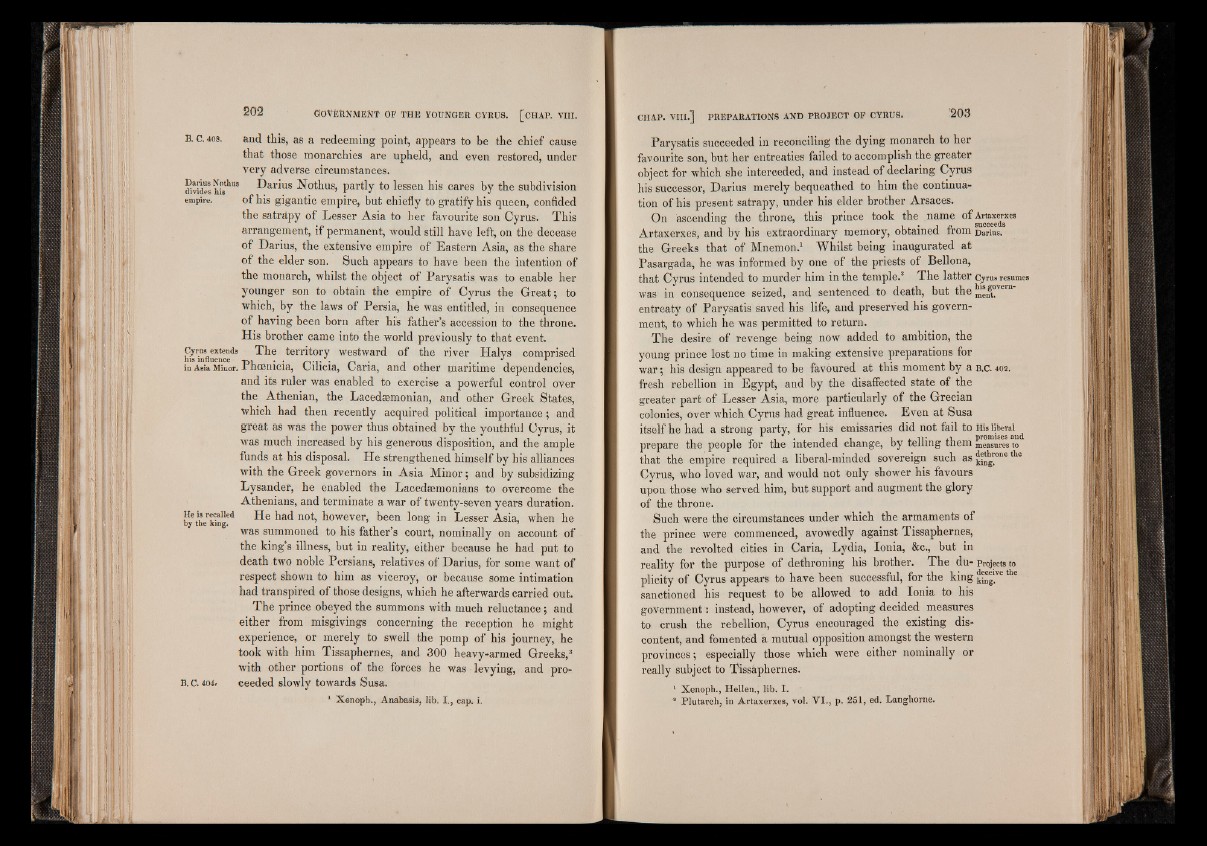
B. C. 408. and this, as a redeeming point, appears to be the chief cause
that those monarchies are upheld, and even restored, under
Very adverse circumstances,
divides Hi»tliUS Nothus, partly to lessen his cares by the subdivision
empire. of his gigantic empire, but chiefly to gratify his queen, confided
the satrapy of Lesser Asia to her favourite son Cyrus. This
arrangement, if permanent, would still have left, on the decease
of Darius, the extensive empire of Eastern Asia, as the share
of the elder son. Such appears to have been the intention of
the monarch, whilst the object of Parysatis was to enable her
younger son to obtain the empire of Cyrus the Great; to
which, by the laws of Persia, he was entitled, in consequence
of having been born after his father’s accession to the throne.
His brother came into the world previously to that event.
Cyrus extends The territory westward of the river Halys comprised
his influence -*3 , . ♦ • r* i • • * . in Asia Minor, uncemcia, tniicia, Lana, and other maritime dependencies,
and its ruler was enabled to exercise a powerful control over
the Athenian, the Lacedaemonian, and other Greek States,
which had then recently acquired political importance; and
great as was the power thus obtained by the youthful Cyrus, it
was much increased by his generous disposition, and the ample
funds at his disposal. He strengthened himself by his alliances
with the Greek governors in Asia Minor; and by subsidizing
LysandeP, he enabled the Lacedaemonians to overcome the
Athenians, and terminate a war of twenty-seven years duration.
He is recalled He had not, however, been long in Lesser Asia, when he by the king, ' . 7 0 # ’
was summoned to his father’s court, nominally on account of
the king’s illness, but in reality, either because he had put to
death two noble Persians, relatives of Darius, for some want of
respect shown to him as viceroy, or because some intimation
had transpired of those designs, which he afterwards carried out.
The prince obeyed the summons with much reluctance; and
either from misgivings concerning the reception he might
experience, or merely to swell the pomp of his journey, he
took with him Tissaphernes, and 300 heavy-armed Greeks,3
with other portions of the forces he was levying, and pro-
B. C. 404. ceeded slowly towards Susa.
1 Xanoph., Anabasis, lib. I., cap. i.
Parysatis succeeded in reconciling the dying monarch to her
favourite son, but her entreaties failed to accomplish the greater
object for which she interceded, and instead of declaring Cyrus
his successor, Darius merely bequeathed to him the continuation
of his present satrapy, under his elder brother Arsaces.
On ascending the throne, this prince took the name of sAurctcaexoedrsxes
Artaxerxes, and by his extraordinary memory, obtained from Darius,
the Greeks that of Mnemon.1 Whilst being inaugurated at
Pasargada, he was informed by one of the priests of Bellona,
that Cyrus intended to murder him in the temple.8 The latter cym s resumes
was in consequence seized, and sentenced to death, but the nJ^ veni
entreaty of Parysatis saved his life, and preserved his government,
to which he was permitted to return.
The desire of revenge being now added to ambition, the
young prince lost no time in making extensive preparations for
war; his design appeared to be favoured at this moment by a b .c . 402.
fresh rebellion in Egypt, and by the disaffected state of the
greater part of Lesser Asia, more particularly of the Grecian
colonies, over which Cyrus had great influence. Even at Susa
itself he had a strong party, for his emissaries did not fail to His liberal
prepare the people for the intended change, by telling them measures to
that the empire required a liberal-minded sovereign such as the
Cyrus, who loved war, and would not only shower his favours
upon those who served him, but support and augment the glory
of the throne.
Such were the circumstances under which the armaments of
the prince were commenced, avowedly against Tissaphernes,
and the revolted cities in Caria, Lydia, Ionia, &c., but in
reality for the purpose of dethroning his brother. The du- Projects to
plicity of Cyrus appears to have been successful, for the king 4116
sanctioned his request to be allowed to add Ionia to his
government: instead, however, of adopting decided measures
to crush the rebellion, Cyrus encouraged the existing discontent,
and fomented a mutual opposition amongst the western
provinces; especially those which were either nominally or
really subject to Tissaphernes.
1 Xenoph., Hellen., lib. I.
'* Plutarch, in Artaxerxes, vol. V I., p. 251, ed. Langliorne.